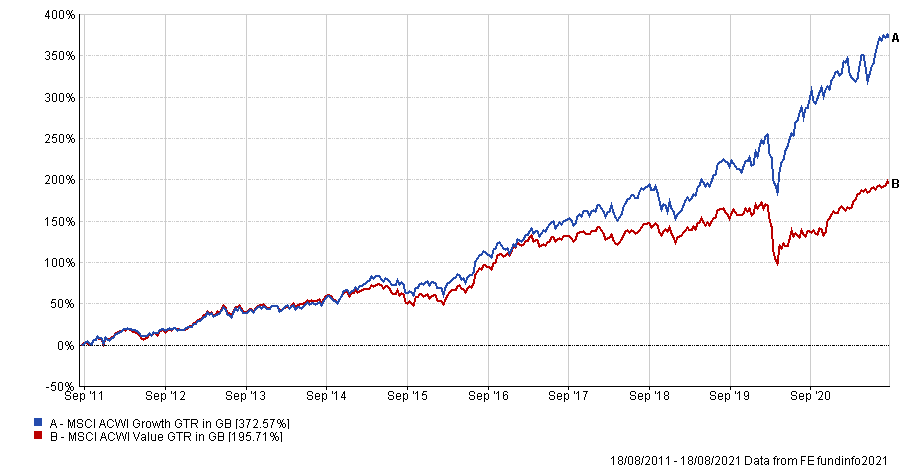Traditional value sectors such as oil, energy and tobacco are not synonymous with ethical investing, but that doesn’t mean the growth style is only way to go about investing sustainably.
Environmental, social and governance (ESG) investing has experienced a significant increase in investor interest over the past few years, gaining momentum even more in 2020 when social and environmental problems were amplified during the pandemic.
Calastone data demonstrated this trend. In December last year, there were net inflows of £1.1bn into ESG-focused funds, equivalent to the total inflows from 2015 to 2018 in this part of the market. This strong momentum has continued in 2021 – Calastone recently said inflows into ESG funds made up 90% of July’s total equity inflows (£995m).
But a lot of this investment has been focused on growth strategies, for two reasons.
First, as previously mentioned, a lot of the typical value sectors generally don’t to score well on an ESG basis.
Fabio Dossena, investment director at MainStreet Partners, highlighted oil & gas, financials and commodities as examples of sectors that “normally struggle with poor ESG ratings due to the negative impact on society and ethics”.
Roberta Barr, head of ESG on Schroder’s value team and a manager on the Schroder Global Sustainable Value fund, added to this, saying that growth companies are often scored well on ESG by data providers. In contrast, she said value is currently associated with buying carbon-intensive or ESG-unfriendly companies.
Another reason is that the market has very much been driven by growth investing for the past decade and many investors have simply focused on that style of investing. Barr suggested investors haven’t sought out sustainability in value as much because “it’s just not in favour at the moment”.
The chart below demonstrates how growth stocks have excelled throughout years of ongoing dovish monetary policy and low interest rate environment, both beneficial to this style of investing.
MSCI ACWI Growth vs MSCI ACWI Value indices over 10yrs

Source: FE Analytics
This bias changed towards the end of 2020 when the rollout of several effective Covid-19 vaccines created a pathway out of the pandemic and switched markets into a recovery phase. This triggered investors to seek out cyclical and value exposure to benefit from this ‘reopening trade’.
Because of this rotation, ESG funds have struggled to perform as well as they did in 2020, Dossena said, because their high growth allocation makes hem “highly sensitive to more hawkish monetary stances”.
But the perception that you cannot apply a sustainable lens to value is not accurate, Barr argued.
The manager said that it’s very easy to get excited about some of the growth stocks in the sustainability space, “which will certainly change the world”, but added that investors have missed a “whole host of stocks” in the value space. Investors can find “ESG leaders” at value’s discount.
HU Group
One example of this, Barr said, is a name which is held in the Schroder Global Sustainable Value fund: HU Group Holdings.
The company is a Japanese diagnostic testing business with a clear, positive societal impact as its clinical lab testing was crucial for Covid-19 testing during the pandemic.
HU Group also carries out clinical lab testing sterilisation and is Japan's second largest in-vitro diagnostic testing company.
One of the main things that stood out about HU Group was its strong corporate governance, a poignant characteristic in a Japanese company which have had a legacy of poor governance in the past.
Over the past five years the company’s share price is down 35.3%, according to Google Finance. That said, it has rallied 32.3% over the past year, as the need for diagnostic testing services rocketed.
IBM
A second example is IBM, which operates in growth areas such as cloud technology and artificial intelligence (AI). However, its valuation is in “stark contrast to US tech, despite IBM having a large exposure to the products the market is excited about elsewhere”, Barr said.
Over five years the share price has fallen 13.3%, according to Google Finance. But it has risen 12.1% over the past 12 months.
Its low valuation is what makes it a value stock but what makes IBM an ESG leader is a continuing investment and development in the aforementioned growth areas – cloud and IA technology have a “significant positive impact on society”, Barr said.
For example, the company’s AI programme, Watson, is being used for long-range weather forecasting and climate modelling and as a healthcare diagnostic tool to help improve the accuracy of reading patients’ scans.
This is just one of the projects IBM has invested some of the $45bn it has funnelled into the research & development of cloud and AI since 2012. The company’s “dedication” to developing this part of its business is a major plus, according to Barr.
Added to this, IBM was a founding corporate member of the US Climate Leadership Council, which aims to bring about a tax on carbon emissions and return the tax via a dividend to US citizens as a ‘reward for good behaviour’.
IBM’s involvement in this is an obvious example its ESG commitments, Barr said.
“We can still tap into that value premium whilst not compromising on our sustainability criteria,” Barr concluded.




